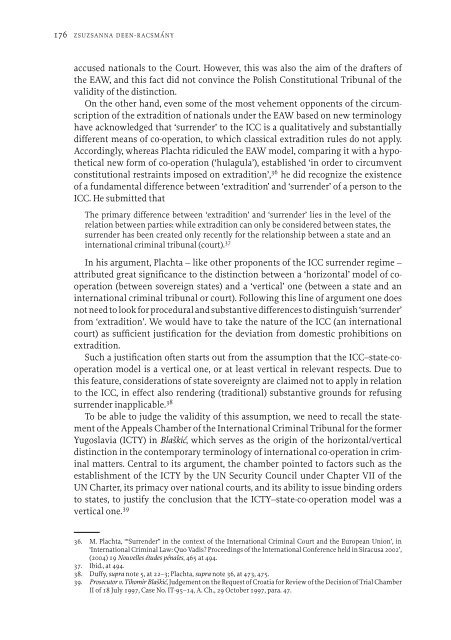Lessons of the European Arrest Warrant for Domestic ...
Lessons of the European Arrest Warrant for Domestic ...
Lessons of the European Arrest Warrant for Domestic ...
Create successful ePaper yourself
Turn your PDF publications into a flip-book with our unique Google optimized e-Paper software.
176 ZSUZSANNA DEEN-RACSMÁNYaccused nationals to <strong>the</strong> Court. However, this was also <strong>the</strong> aim <strong>of</strong> <strong>the</strong> drafters <strong>of</strong><strong>the</strong> EAW, and this fact did not convince <strong>the</strong> Polish Constitutional Tribunal <strong>of</strong> <strong>the</strong>validity <strong>of</strong> <strong>the</strong> distinction.On <strong>the</strong> o<strong>the</strong>r hand, even some <strong>of</strong> <strong>the</strong> most vehement opponents <strong>of</strong> <strong>the</strong> circumscription<strong>of</strong> <strong>the</strong> extradition <strong>of</strong> nationals under <strong>the</strong> EAW based on new terminologyhave acknowledged that ‘surrender’ to <strong>the</strong> ICC is a qualitatively and substantiallydifferent means <strong>of</strong> co-operation, to which classical extradition rules do not apply.Accordingly, whereas Plachta ridiculed <strong>the</strong> EAW model, comparing it with a hypo<strong>the</strong>ticalnew <strong>for</strong>m <strong>of</strong> co-operation (‘hulagula’), established ‘in order to circumventconstitutional restraints imposed on extradition’, 36 he did recognize <strong>the</strong> existence<strong>of</strong> a fundamental difference between ‘extradition’ and ‘surrender’ <strong>of</strong> a person to <strong>the</strong>ICC. He submitted thatThe primary difference between ‘extradition’ and ‘surrender’ lies in <strong>the</strong> level <strong>of</strong> <strong>the</strong>relation between parties: while extradition can only be considered between states, <strong>the</strong>surrender has been created only recently <strong>for</strong> <strong>the</strong> relationship between a state and aninternational criminal tribunal (court). 37In his argument, Plachta – like o<strong>the</strong>r proponents <strong>of</strong> <strong>the</strong> ICC surrender regime –attributed great significance to <strong>the</strong> distinction between a ‘horizontal’ model <strong>of</strong> cooperation(between sovereign states) and a ‘vertical’ one (between a state and aninternational criminal tribunal or court). Following this line <strong>of</strong> argument one doesnot need to look <strong>for</strong> procedural and substantive differences to distinguish ‘surrender’from ‘extradition’. We would have to take <strong>the</strong> nature <strong>of</strong> <strong>the</strong> ICC (an internationalcourt) as sufficient justification <strong>for</strong> <strong>the</strong> deviation from domestic prohibitions onextradition.Such a justification <strong>of</strong>ten starts out from <strong>the</strong> assumption that <strong>the</strong> ICC–state-cooperationmodel is a vertical one, or at least vertical in relevant respects. Due tothis feature, considerations <strong>of</strong> state sovereignty are claimed not to apply in relationto <strong>the</strong> ICC, in effect also rendering (traditional) substantive grounds <strong>for</strong> refusingsurrender inapplicable. 38To be able to judge <strong>the</strong> validity <strong>of</strong> this assumption, we need to recall <strong>the</strong> statement<strong>of</strong> <strong>the</strong> Appeals Chamber <strong>of</strong> <strong>the</strong> International Criminal Tribunal <strong>for</strong> <strong>the</strong> <strong>for</strong>merYugoslavia (ICTY) in Blaškić, which serves as <strong>the</strong> origin <strong>of</strong> <strong>the</strong> horizontal/verticaldistinction in <strong>the</strong> contemporary terminology <strong>of</strong> international co-operation in criminalmatters. Central to its argument, <strong>the</strong> chamber pointed to factors such as <strong>the</strong>establishment <strong>of</strong> <strong>the</strong> ICTY by <strong>the</strong> UN Security Council under Chapter VII <strong>of</strong> <strong>the</strong>UN Charter, its primacy over national courts, and its ability to issue binding ordersto states, to justify <strong>the</strong> conclusion that <strong>the</strong> ICTY–state-co-operation model was avertical one. 3936. M. Plachta, ‘“Surrender” in <strong>the</strong> context <strong>of</strong> <strong>the</strong> International Criminal Court and <strong>the</strong> <strong>European</strong> Union’, in‘International Criminal Law: Quo Vadis? Proceedings <strong>of</strong> <strong>the</strong> International Conference held in Siracusa 2002’,(2004) 19 Nouvelles etudes ´ pénales, 465 at 494.37. Ibid., at 494.38. Duffy, supra note 5, at 22–3; Plachta, supra note 36, at 473, 475.39. Prosecutor v. Tihomir Blaski ˇ c, ´ Judgement on <strong>the</strong> Request <strong>of</strong> Croatia <strong>for</strong> Review <strong>of</strong> <strong>the</strong> Decision <strong>of</strong> Trial ChamberII <strong>of</strong> 18 July 1997, Case No. IT-95–14, A. Ch., 29 October 1997, para. 47.
















